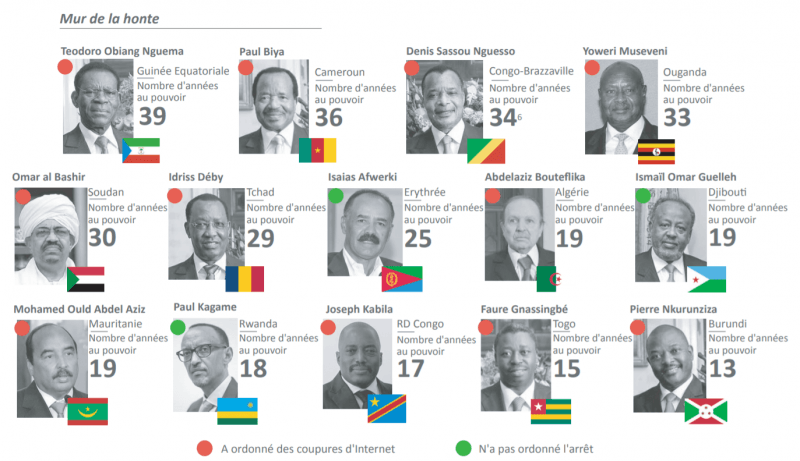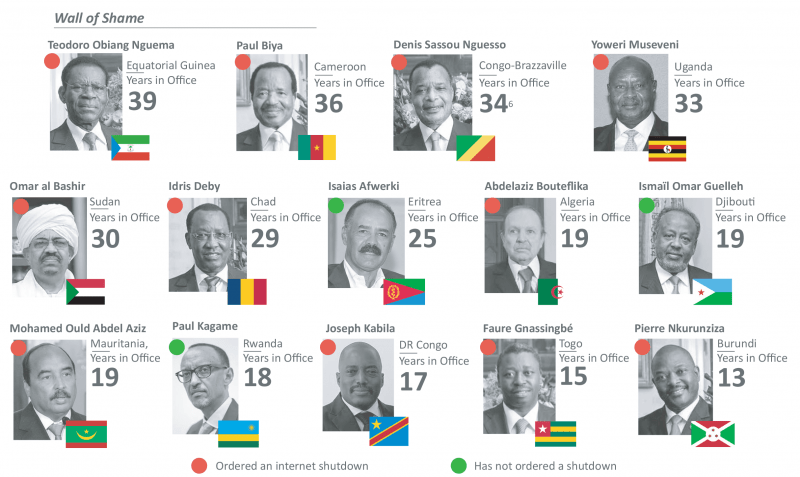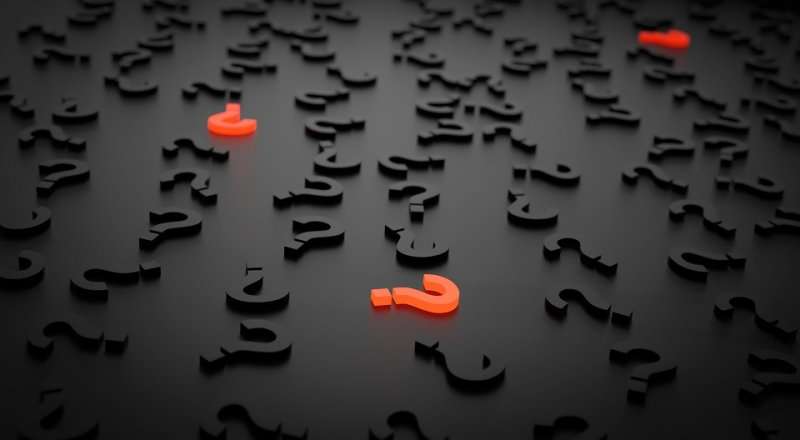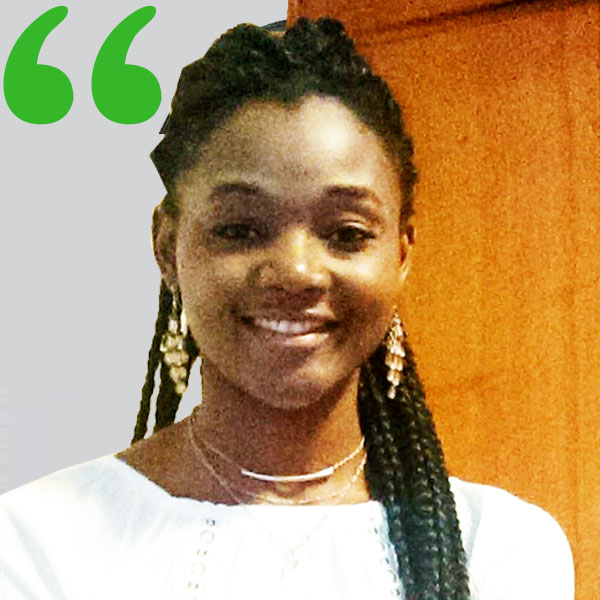Nouveau Rapport |
Au cours des quatre dernières années, pas moins 22 gouvernements africains ont ordonné des coupures du réseau Internet. Depuis le début de l’année 2019, six pays africains dont l’Algérie, la République Démocratique du Congo (RDC), le Tchad, le Gabon, le Soudan et le Zimbabwe ont déjà connu des coupures d’Internet.
Un nouveau rapport produit par le CIPESA (The Collaboration on International ICT Policy for East and Southern Africa) intitulé «Dictateurs et restrictions : cinq dimensions des coupures d’Internet en Afrique» souligne cependant que ces coupures d’Internet sont exclusivement opérées par les Etats les plus despotiques d’Afrique.
 Selon ce rapport, 77% des pays où les coupures d’Internet ont été opérées au cours des cinq dernières années sont classés comme autoritaires sur l’indice de démocratie produit par le service de renseignement économique de l’Economist (Economist Intelligence Unit). Hormis ceux-là, tous les autres pays africains qui ont procédé aux coupures de services de communications sont classés dans la catégorie des régimes hybrides, ce qui signifie qu’ils ont certains éléments de démocratie combinés à de fortes doses d’autoritarisme.
Selon ce rapport, 77% des pays où les coupures d’Internet ont été opérées au cours des cinq dernières années sont classés comme autoritaires sur l’indice de démocratie produit par le service de renseignement économique de l’Economist (Economist Intelligence Unit). Hormis ceux-là, tous les autres pays africains qui ont procédé aux coupures de services de communications sont classés dans la catégorie des régimes hybrides, ce qui signifie qu’ils ont certains éléments de démocratie combinés à de fortes doses d’autoritarisme.
Les régimes autoritaires qui ont ordonné des coupures du réseau sont l’Algérie, le Burundi, la République Centrafricaine (RCA), le Cameroun, le Tchad, la RDC, le Congo (Brazzaville), l’Egypte, la Guinée équatoriale, le Gabon, l’Ethiopie, la Libye, la Mauritanie, le Niger, le Togo, le Soudan, et le Zimbabwe. Les régimes hybrides qui ont procédé à des coupures d’Internet comprennent la Gambie, le Mali, le Maroc, la Sierra Léone et l’Ouganda.
Quant aux pays classés comme autoritaires mais qui n’ont pas effectué de telles coupures, le rapport indique qu’il est probable que «l’Etat autoritaire soit si brutal et terrifiant que la société civile ou tout mouvement d’opposition ou de protestation – en ligne et hors ligne- soit étouffé dans l’œuf » ou alors que «les mesures de surveillance d’Internet en place rendent toute coupure inutile». Ces pays comprennent Djibouti, l’Erythrée et le Rwanda.
Le rapport note également que les pays dont les dirigeants sont au pouvoir depuis plusieurs années sont plus enclins à ordonner des coupures d’Internet. En janvier 2019, 79% des 14 dirigeants africains qui avaient été au pouvoir depuis 13 ans ou plus avaient ordonné des coupures, principalement pendant les périodes électorales et les protestations publiques contre des politiques gouvernementales.
Il s’agit notamment de Teodoro Obiang Nguema en Guinée équatoriale (39 ans); de Paul Biya au Cameroun (36); de Denis Sassou Nguesso au Congo Brazaville (34); de Yoweri Museveni en Ouganda (33); d’Omar El Bashir au Soudan (30); d’Idriss Déby au Tchad (29); d’Abdelaziz Bouteflika en Algérie (19); de Mohamed Ould Abdel Aziz en Mauritanie (19); de Joseph Kabila en RDC (17); de Faure Gnassingbé au Togo (15); et de Pierre Nkurunziza au Burundi (13).

Selon ce rapport, l’année 2019 pourrait connaitre un nombre record de coupures du réseau, car au moins 20 Etats africains tiendront diverses formes d’élections, qu’elles soient locales, législatives, générales ou présidentielles.
Au fil des ans, de nombreuses perturbations du réseau se sont généralement produites dans les pays africains autocratiques autour de périodes électorales, et parmi les Etats qui ont prévu la tenue d’élections durant cette année, certains avaient déjà effectué diverses formes de coupures au cours de périodes électorales précédentes (comme la Guinée équatoriale), de manifestations publiques (Cameroun, Togo) ou à l’occasion d’examens scolaires nationaux (Algérie, Ethiopie).
Autres faits saillants du rapport «Dictateurs et restrictions : cinq dimensions des coupures d’Internet en Afrique» :
Le rapport note que les gouvernements qui ordonnent des coupures et les fournisseurs de services Internet (FSI) qui les mettent en œuvre, assument de plus en plus ouvertement ces actions. Les gouvernements se justifient en disant que les technologies numériques sont de plus en plus utilisées pour diffuser de fausses informations, propager des discours de haine et, prétendument, pour attiser le désordre public et compromettre la sécurité nationale.
De leur côté, de plus en plus de FSIs et d’opérateurs de plateformes de communication rendent publiques leurs réponses aux injonctions de coupure, aux requêtes reçues pour fournir des données personnelles des utilisateurs et aux demandes d’interception émanant des gouvernements grâce aux rapports de transparence. Une telle évolution pourrait conduire à une banalisation des coupures. Comme conséquence, un nombre croissant de gouvernements n’auraient plus honte d’assumer ouvertement les ordres de coupure. Des éléments positifs sont à noter cependant, dans la mesure où cela pourrait servir de base pour l’ouverture d’un procès ou faire avancer le plaidoyer.
Le rapport réaffirme que les coupures d’Internet, même de courte durée, affectent de nombreux pans de l’économie nationale et que leurs impacts persistent bien au-delà des périodes durant lesquelles l’accès a été perturbé. «Même si seuls cinq des pays qui ont déjà coupé l’accès à Internet et qui tiendront des élections refont ce genre d’action durant l’année en cours, notamment la limitation d’accès aux applications telles que Twitter, Facebook et WhatsApp au niveau national pendant cinq jours chacun, le rapport estime que les pertes économiques s’élèveraient à plus de 65,6 millions de dollars américains».
En outre, le rapport note que certains pays qui coupent l’accès à Internet ont des taux d’utilisation d’Internet les plus bas, et des coûts de paquets de données les plus élevés d’Afrique. La logique pourrait suggérer que les pays à faible consommation d’Internet soient les moins enclins à couper l’accès à Internet, du fait que la population en ligne soit trop insignifiante pour menacer «l’ordre public» ou «la sécurité nationale», ou même constituer une entrave sérieuse contre le pouvoir en place. Paradoxalement, le rapport trouve que les gouvernements africains les moins démocratiques, indépendamment du nombre de leurs citoyens qui utilisent internet, craignent la capacité de cet outil à renforcer la participation citoyenne et le franc-parler des citoyens ordinaires face au pouvoir.
Ce rapport peut être téléchargé sur CIPESA.
Despots and Disruptions: Five Dimensions of Internet Shutdowns in Africa
Report |
Up to 22 African governments have ordered network disruptions in the last four years and since the start of 2019, six African countries – Algeria, the Democratic Republic of Congo (DR Congo), Chad, Gabon, Sudan and Zimbabwe – have experienced internet shutdowns.
A new report by the Collaboration on International ICT Policy for East and Southern Africa (CIPESA) titled Despots and Disruptions: Five Dimensions of Internet Shutdowns in Africa notes, however, that internet shutdowns remain the preserve of Africa’s most despotic states.
 According to the report, 77% of the countries where internet shutdowns have been ordered in the last five years are categorised as authoritarian under the Democracy Index produced by the Economist Intelligence Unit. All the other African countries that have disrupted communications are categorised as hybrid regimes, meaning they have some elements of democracy with strong doses of authoritarianism.
According to the report, 77% of the countries where internet shutdowns have been ordered in the last five years are categorised as authoritarian under the Democracy Index produced by the Economist Intelligence Unit. All the other African countries that have disrupted communications are categorised as hybrid regimes, meaning they have some elements of democracy with strong doses of authoritarianism.
The authoritarian regimes that have ordered network disruptions include Algeria, Burundi, the Central African Republic (CAR), Cameroon, Chad, DR Congo, Congo (Brazzaville), Egypt, Equatorial Guinea, Gabon, Ethiopia, Libya, Mauritania, Niger, Togo, Sudan, and Zimbabwe. Hybrid regimes that have ordered internet shutdowns include the Gambia, Mali, Morocco, Sierra Leone, and Uganda.
For countries that are classified as authoritarian but have not ordered shutdowns, the report states that it is likely that “the authoritarian state is so brutal or commanding that civil society or opposition organising and protests – online and offline – are unfathomable” or “internet control measures in place render ordering overt internet disruptions unnecessary.” These countries include Djibouti, Eritrea and Rwanda.
The report also notes that countries whose leaders have been in power for several years are more likely to order internet shutdowns. As of January 2019, of the 14 African leaders who had been in power for 13 years or more, 79% had ordered shutdowns, mostly during election periods and public protests against government policies.
These included Equatorial Guinea’s Teodoro Obiang Nguema (39 years); Cameroon’s Paul Biya (36); Congo Brazaville’s Denis Sassou Nguesso (34); Uganda’s Yoweri Museveni (33); Sudan’s Omar El Bashir (30); Chad’s Edris Deby (29); Algeria’s Abdelaziz Bouteflika (19); Mauritania’s Mohamed Ould Abdel Aziz (19); DR Congo’s Joseph Kabila (17); Togo’s Faure Gnassingbé (15); and Burundi’s Pierrie Nkurunziza (13).

The report says 2019 could see a record number of network disruptions since at least 20 African states will hold various forms of elections including local, legislative, general or presidential.
Over the years, many network disruptions have typically occurred in autocratic African countries around election times, and among the states scheduled to conduct polls this year are those which have previously initiated various forms of shutdowns during elections periods (such as Equatorial Guinea), public protests (Cameroon, Togo), and national school exams (Algeria, Ethiopia).
Other highlights from the Despots and Disruptions: Five Dimensions of Internet Shutdowns in Africa report:
The report notes that governments that order disruptions and the Internet Service Providers (ISPs) that implement them now more openly acknowledged the disruptions. Governments often cite digital technologies’ increasing usage to spread disinformation, propagate hate speech, and to allegedly fan public disorder and undermine national security.
For their part, more ISPs and platform operators are making public their responses to shutdown directives as and to user information and interception requests from governments through transparency reports. This openness could represent the normalisation of shutdowns, implying that a growing number of governments feel no shame in openly acknowledging ordering shutdowns. However, it has positive elements too, as it can be the basis of litigation and push back advocacy.
The report reiterates that internet disruptions, however short-lived, affect many facets of the national economy and tend to persist far beyond the days on which access is disrupted. “If just five of the countries that have previously disrupted internet access and who are going to the polls this year disrupted access to internet including apps such as Twitter, Facebook and Whatsapp at a nationwide level for five days each, the estimated economic cost would be more than USD 65.6 million,” the report states.
Further, the report notes that the countries that disrupt internet access have some of the lowest internet usage figures and highest data prices in Africa. Conventional wisdom might suggest that low-internet usage countries would be the last to disrupt internet access as they might consider the population online too small to threaten “public order” or “national security” or to threaten the regime’s hold on power. On the contrary, says the report, it appears that African governments with democracy deficits, regardless of the numbers of their citizens that use the internet, fear the power of the internet in enabling citizen organising and empowering ordinary people to speak truth to power.
The report can be downloaded here.
Leveraging ICT to Promote the Right to Information in Uganda: Insights from Ask Your Government Portal
By Loyce Kyogabirwe |
Despite the existence of legal and regulatory frameworks that promote the right to information, access to public information remains a big challenge in Uganda. The potential of ICT to promote citizens’ access to information is widely acknowledged and in 2014, the government and civil society partners launched the Ask Your Government (AYG) web platform that allows citizens to make online information requests to government Ministries, Departments and Agencies (MDAs).
However, four years on, it is evident that most citizens might not be aware of their right to information let alone the procedures for accessing information and data that is held by public bodies. Meanwhile, public officials continue to ignore citizens’ information requests despite efforts to equip both the duty bearers and rights holders, including information officers, journalists as well as women’s rights organisations, with knowledge and skills on rights and responsibilities.
User statistics from the AYG portal show an increase in the number of requests as well as number of public agencies registered on the portal. Between 2014 and 2016, only 243 requests were submitted to 76 agencies. But by June 2018, the number of information requests submitted had reached 2,450, to 106 MDAs (20 Ministries, 60 Departments and Agencies and 26 to Local Government Officials).

The highest number of information requests have been submitted to the Uganda Revenue Authority (URA) – 350 between June 2014 and June 2018, followed by the Ministry of Defence with 152.
However, the nature of requests lodged still indicates a misinterpretation of what falls under a public information request as most of the submissions are related to internships and Tax Identification Numbers (TIN). Perhaps this is an indication of the priority information needs of many of the portal’s users.
Also of concern is the low response rate to information requests. Of the 2,450 requests submitted between June 2014 and June 2018, only 121 have been indicated as successful and and 102 as partially successful, representing an average response rate of 9%. Less than 1% of requests (20) were rejected while those still awaiting responses are 2,074 or 85%. The 85% can be regarded as refusals under section 18 of the Access to Information Act (ATIA), 2005 which states: “an information officer fails to give the decision on a request for access to the person concerned within the period contemplated under section 16, the information officer is, for the purposes of this Act, regarded as having refused the request.” The response period is 21 days.
In some cases where public information was requested, users were advised to visit the respective MDAs in order to access such information. For example Davidson Ndyabahika, a journalist working with Uganda Radio Network, requested for statistics of enrolment and performance of both private and public primary and secondary schools in Ntungamo District from 2010 to 2016 from the Ministry of Education and Sports. He was advised to physically visit the Ministry offices where he would be cleared first before accessing such information. Such a response indicates challenges with digitised information storage and retrieval among public agencies although section 10 of the Act mandates information officers to ensure that records of a public body are accessible.
Equally, there are cases where limitations of the portal have emerged and information has been withheld because it can only be provided after payment of the statutory search fees. The ATIA specifies a non-refundable access fee of Uganda Shillings (UGX) 20,000 (USD 5) which remains a high cost for the majority of the population.
The limited levels of government responsiveness to information requests and uptake of AYG by both citizens and public officials impact upon initiatives working to promote access to public information for social accountability and civic engagement. This calls for more capacity enhancement, sensitisation and awareness raising among public officials of their duties and responsibilities as laid down in the Access to Information Act. Likewise, MDAs ought to utilise the different ICT platforms and tools to proactively release public information as prescribed in the Act and make efforts to ensure that citizens are aware of such information and where to find it.
Under Section 7 of the Act, public bodies are mandated to compile manuals containing descriptions, addresses, the nature of work, services and how to access information within six months after the commencement of the Act. However, 13 years since the law was passed, only the Ministry of Lands and Urban Development has adhered to this requirement. Indeed the ministry was in 2015 awarded the most responsive public entity as part of commemoration of International Day for Universal Access to Information (IDUAI).
Likewise, section 43 of the Act requires every minister to submit an annual report to Parliament on requests for records or access to information made to a public body under his or her ministry indicating acceptance or rejection, and reasons for rejection. However, there has never been any report from ministers since 2005 when the Law was passed, and Parliament has never demanded for such reports.
Meanwhile there should be efforts to continuously empower citizens to fully exercise their right of access to information as stated in Article 41 of the Constitution and Section 5 of the ATIA. Such efforts include capacity building of different demographic groups such as women, youth, persons with disabilities (PWDs), journalists, and teachers to demand for public information relating to service delivery and accountability while utilising different ICT platforms and tools including the AYG portal. Public officials should also be empowered to utilise these tools to proactively share public information with citizens.
The AYG is an initiative of the Ministry ICT and National Guidance in partnership with the Africa Freedom of Information Centre (AFIC) and the Collaboration on International ICT Policy for East and Southern Africa (CIPESA).
Simone Toussi

Simone Toussi is CIPESA’s Francophone/Central Africa Project Officer. a strategic communication’s specialist and consultant, with experience in international organizations, NGOs and the private sector. She holds a BA in Modern letters and a MA in Strategies with a major in Advertising from the University of Yaounde 1 (Cameroon), a MA in Development Studies with a major in Media and Communication, from Senghor University of Alexandria (Egypt). She has worked in Canada, Eastern Europe, and Africa. She joined the CIPESA Fellowship program as Researcher on ICT, democracy and human rights in Francophone/Central Africa.
CIPESA Submits Comments to Uganda Communications Commission on Improving Access to ICT for Persons With Disabilities
By Daniel Mwesigwa |
Last year, Uganda’s communications regulator commissioned a study to establish the status of access and usage of Information and Communications Technology (ICT) by Persons With Disabilities (PWDs). In response to a call for comments, CIPESA made submissions to the commission, which could help various government agencies to devise strategies that meaningfully improve usage of digital technologies by PWDs.
According to Uganda’s statistics bureau, persons with disabilities comprise 16% of the country’s population of 37.5 million. However, they face various limitations in accessing and using ICT tools and services. The draft report of the study commissioned by the Uganda Communications Commission (UCC) shows that national ownership of a radio and a mobile phone among PWDs was high at 70% and 69% respectively. Ownership of fixed-line telephones, desktop computers and laptops was very low at 0.5%, 1% and 3.9% respectively. However, 15% of respondents’ households had access to the internet.
Below are highlights from CIPESA’s submission:
1. Disaggregate results by type of disability
While the report highlights respondents’ type of disability (61% had a physical disability, 31% were visually impaired, and 2% had a hearing impairment), it does not show how the nature of disability affects access and usage of ICT. Persons with disabilities are not a homogeneous group and the nature of disability influences how they may perceive, be able to access and to use ICT. It may not be possible therefore to address the distinct needs of different categories of PWDs if data is not disaggregated by type of disability – as indeed it should be disaggregated based on gender, location, income, among other demographics.
2. Comparative analysis of data
The report provides ICT access and usage figures for PWDs (e.g. 69.4% mobile phone ownership; 3.9% had laptop computers and 1% desktop computers; 15% of households had access to the internet). However, these numbers need to be presented and analysed alongside overall national statistics on access and usage if they are to offer direction on the remedial actions needed.
3. Taxes deepening exclusion
Only 14% of respondents had access to a bank account compared to 86% that accessed financial services through other mechanisms such as mobile money, and village savings and loan associations. One third (33%) had access to mobile money, which is lower than the national average of 55%. Further, 41% of the respondents lacked access to any form of financial services, compared to the national average of 22% that is financially excluded.
Worryingly, majority of PWDs (66%) said their use of social media had reduced with the introduction last July of the Over The Top (OTT) tax, while 26% said they were no longer using social media. Only 8% had not changed their usage levels. According to the report, 52% of PWDs access social media on their phones, while 12% access it on their computers.
As CIPESA has previously found, OTT platforms and mobile money networks had considerably eased the lives of PWDs. For example, platforms like WhatsApp were used to disseminate critical information among individuals with hearing impairment before the added cost of using social media rendered them unaffordable to many, who already faced challenges in finding employment and often relied on financial support from others. For UCC and other relevant Uganda Government institutions, these findings should not be taken lightly and should inform policy in this area.
4. Awareness and usage of assistive technologies
Assistive technologies are products, devices, or equipment, used to maintain, increase, or improve the functional capabilities of individuals with disabilities. A very concerning finding in the Report is that 76% of PWDs were not aware of the low-cost Assistive Technologies like manual Perkins Brailler, hand-held magnifiers, hand frames/slates and communication boards. Only 14% of respondents were aware of the Perkins Brailler yet its usage was low at 4%. Just 13% of the respondents were aware of magnifiers yet only 2% used them. Issues of awareness of these technologies, their cost and availability, are apparent. The UCC should offer subsidies for assistive technologies through the universal service access fund, the Rural Communications Development Fund (RCDF).
5. Privacy and data protection
The right to privacy is a core entitlement for every individual under article 27 of the Uganda Constitution. The Persons With Disabilities Act, 2006, section 35 protects PWDs from arbitrary or unlawful interference with their privacy. However, the report does not assess PWDs awareness of their privacy rights or data security skills. Such an assessment is necessary to inform remedies including on capacity development.
6. Public and private sector compliance
Consistent with international conventions and instruments such as the UN Convention on the Rights of Persons with Disabilities (CRPD) and the Sustainable Development Goals (SDGs), as well as domestic laws such as the national constitution, Persons With Disabilities Act 2006, and the National IT and Disability Policy, the emphasis on inclusion and non-discrimination for PWDs cannot be overlooked if the country is to attain her development goals.
As the government works towards implementing the ICT and Disability Policy, the emphasis on Website Accessibility Guidelines (WAG) can be fast-tracked by auditing compliance with the 2014 ‘Guidelines for Development and Management of Government Websites’ which were developed by the National Information Technology Authority Uganda (NITA-U). Entities that do not comply with universal accessibility standards should be sanctioned.
Further, the Equal Opportunities Commission, working with other relevant entities, should require government ministries, departments and agencies (MDAs) and private enterprises which offer public services to prepare annual statements in which they report on how they have worked towards increasing accessibility and inclusiveness for PWDs.
The full submission can be read here.





